After More Than 20 Years Of This Type Of Scam Fake Military Impersonation Scams Are Still Very Common, Especially With European, Latin American, And Asian Victims
Military impersonation scams are a type of online relationship scam or fraud where scammers create fake profiles on social media or dating websites using stolen photos of military personnel.
They then pose as deployed soldiers in conflict areas (Syria, Yemen, Iraq, Afghanistan, etc.) in order to gain the trust of their victims, often women and men who are looking for love or companionship by luring them in and grooming them. Once they have gained the victim’s trust the manipulation begins until the criminals are in full control, the scammers will ask for money or personal information. They may claim that they need money to pay for their deployment expenses, to obtain leave to come and visit the victim, or they cannot buy food, for a gift for a child, to smuggle gold or gems out of the country, or they may ask for the victim’s banking information in order to send them a “gift.”
These scams can be very convincing, as scammers often take the time to create detailed profiles and backstories. However, there are a few things you can do to protect yourself from falling victim to a military impersonation scam:
IF ANY SOLDIER DEPLOYED OVERSEAS ASKS YOU FOR MONEY THEY ARE 100% A SCAMMER!
With over ONE BILLION (more than 1,000,000,000) fake identities online, there are plenty of scammers to go around. 1 Billion is AFTER the social media companies delete nearly 1 billion a year! That is how big this all is! And there are nearly a million new victims a year. You are far from being alone in this.
The Odds Are Nearly 100% That The Soldier Who Contacted You Out Of The Blue Is A Scammer!
If you think you have been the victim of a military impersonation scam, you should report it to the authorities and to the website, dating app, or platform where you met the scammer.
Online Romance Scam Information About Stolen Soldier Identities
Impersonation & Identity Theft Of United States Army Soldiers/Military – If You Suspect Someone Then They ARE A Scammer
You may have a suspicion about someone you have met online. You may not know it yet but your instincts picked up on something out of place (below we explain the Red Flags in more detail). Go with your gut – if it feels wrong it is!
Click Here To Learn More
United States Military & Social Media
So much of the information spread around about scammers and fake military is nothing but an urban legend. False information, misinterpretation, or rumors spread like lice in a preschool. This article will help to clear up many of these preconceptions that are nothing but urban legends and replace them with fact.
Yes, the United States has military personnel in EVERY country on Earth (except a handful). Most of these are assigned to United States Embassies, however, there are active military missions in over 100 countries – mostly fighting terrorists around the globe. Not since World War 2 has there been the deployment of United States and NATO forces in more counties.
Find the information you need to know if someone is real or fake here.
Click Here To Learn More About The U.S. Military
Click Here For A Guide To U.S. Military Ranks
Right Up Front – If Someone Sends You A Photo Of Their ID Card They ARE A Scammer!
That is because it is illegal for United States Military personnel to copy their ID cards. It is that simple!
However, so many people want to understand how to make sure they are fakes that we have created the following.
United States Military ID Cards Are Called “CAC” – Common Access Cards. The CAC, a “smart” card about the size of a credit card, is the standard identification for active duty uniformed Service personnel, Selected Reserve, U.S. Department of Defence [DoD] civilian employees, and eligible contractor personnel. It is also the principal card used to enable physical access to buildings and controlled spaces, and it provides access to DoD computer networks and systems.
Find the information you need to know if someone is real or fake here.
Click Here To Learn More
Impersonation Galleries
These are galleries of the real person – organized by their name – whose photos & identity were stolen and used for Romance Scams / Pig Butchering Scams.
Click here for our Impersonation Galleries
Looking For Fake Soldier Photos?
Visit ScammerPhotos.com For The Latest Scammer Photos
More Information To Help You Spot Fake Soldiers & Military Impersonation Scammers
More Military Information
- Fake Soldiers – Impersonation Scams (romancescamsnow.com)
- U.S. Department of Defense Military Social Media Use Policy – 2022 (romancescamsnow.com)
- Generals & Military Men & Women, Politicians & Diplomats, Celebrities, & Actors That Scammers Love (romancescamsnow.com)
- Soldier Impersonation – Scam Basics (romancescamsnow.com)
- How To Spot Fake U.S. Passports [UPDATED] (romancescamsnow.com)
- Victimology – What Is It? (scamsnow.com)
Understanding These Scammers
- Stolen Photos – Scam Basics (romancescamsnow.com)
- Why Scammers Don’t Give Up (scamsnow.com)
- SCARS™ Scam Basics: Scammer Acid Test (romancescamsnow.com)
- Basic Fakery Deception & Lies (romancescamsnow.com)
- Scam Basics: Dead Wife (romancescamsnow.com)
- Romance Scammers – Top Lies They Tell (romancescamsnow.com)
- Common Tactics & Types Of Relationship Scams (romancescamsnow.com)
More Articles That May Be Helpful
- Military Romance Scams: Are You a Target? | Military.com
- How to Avoid Military Romance Scams | Signs of Common Military Scams | Trusted Since 1922 (rd.com)
- CID Lookout: Social Media Impersonation of Soldier Accounts > Department of the Army Criminal Investigation Division > Article Display
- How To Spot A Fake Military ID Card – SCRACVS
- What questions to ask a military scammer – Forces Penpals GB
Military Scams: What to Look For
There are a variety of words and phrases used by military impersonation scammers to hook unsuspecting women and men into fake relationships. Here are some of them
- They say they are on a “peacekeeping” mission.
- They say they are looking for an honest woman/man.
- They note that their parents, wife, or husband is deceased.
- They say they have a child or children being cared for by a nanny or other guardian.
- They profess their love almost immediately.
- They refer to you as “my love,” “my darling,” “sweetheart” or any other affectionate endearment term almost immediately.
- They tell you they cannot wait to be with you.
- They tell you they cannot talk on the phone or via webcam for security reasons.
- They tell you they are sending you something (money, jewelry) through a diplomat.
- They claim to be in the U.S. military; however, their English and grammar do not match that of someone born and raised in the United States.
SCARS Resources:
- Getting Started Right: ScamVictimsSupport.org
- Sextortion Scam Victims: Sextortion Victims Support – The Essentials (scamvictimssupport.org)
- For New Victims of Relationship Scams newvictim.AgainstScams.org
- Subscribe to SCARS Newsletter newsletter.againstscams.org
- Sign up for SCARS professional support & recovery groups, visit support.AgainstScams.org
- Join our Scam Survivors United Chat & Discussion Group facebook.com/groups/scam.survivors.united
- Find competent trauma counselors or therapists, visit counseling.AgainstScams.org
- Become a SCARS Member and get free counseling benefits, visit membership.AgainstScams.org
- Report each and every crime, learn how to at reporting.AgainstScams.org
- Learn more about Scams & Scammers at RomanceScamsNOW.com and ScamsNOW.com
- Scammer photos ScammerPhotos.com
- SCARS Videos youtube.AgainstScams.org
- Self-Help Books for Scam Victims are at shop.AgainstScams.org
- Donate to SCARS and help us help others at donate.AgainstScams.org
- Worldwide Crisis Hotlines: https://blog.opencounseling.com/suicide-hotlines/
Other Cyber Resources
- Block Scam Domains: Quad9.net
- Global Cyber Alliance ACT Cybersecurity Tool Website: Actionable Cybersecurity Tools (ACT) (globalcyberalliance.org) https://act.globalcyberalliance.org/index.php/Actionable_Cybersecurity_Tools_(ACT)_-_Simplified_Cybersecurity_Protection
- Wizer Cybersecurity Training – Free Security Awareness Training, Phishing Simulation and Gamification (wizer-training.com)
-/ 30 /-
What do you think about this?
Please share your thoughts in a comment below!
Do You Need Support?
Get It Now!
SCARS provides the leading Support & Recovery program for relationship scam victims – completely FREE!
Our managed peer support groups allow victims to talk to other survivors and recover in the most experienced environment possible, for as long as they need. Recovery takes as long as it takes – we put no limits on our support!
SCARS is the most trusted support & education provider in the world. Our team is certified in trauma-informed care, grief counseling, and so much more!
To apply to join our groups visit support.AgainstScams.org
We also offer separate support groups for family & friends too.
Become a
SCARS STAR™ Member
SCARS offers memberships in our STAR program, which includes many benefits for a very low annual membership fee!
SCARS STAR Membership benefits include:
- FREE Counseling or Therapy Benefit from our partner BetterHelp.com
- Exclusive members-only content & publications
- Discounts on SCARS Self-Help Books Save
- And more!
To learn more about the SCARS STAR Membership visit membership.AgainstScams.org
To become a SCARS STAR Member right now visit join.AgainstScams.org
To Learn More Also Look At Our Article Catalogs
Scam & Crime Types
More SCARS
- ScamsNOW Magazine – ScamsNOW.com
- ContraEstafas.org
- ScammerPhotos.com
- AnyScam.com – reporting
- AgainstScams.org – SCARS Corporate Website
- SCARS YouTube Video Channel


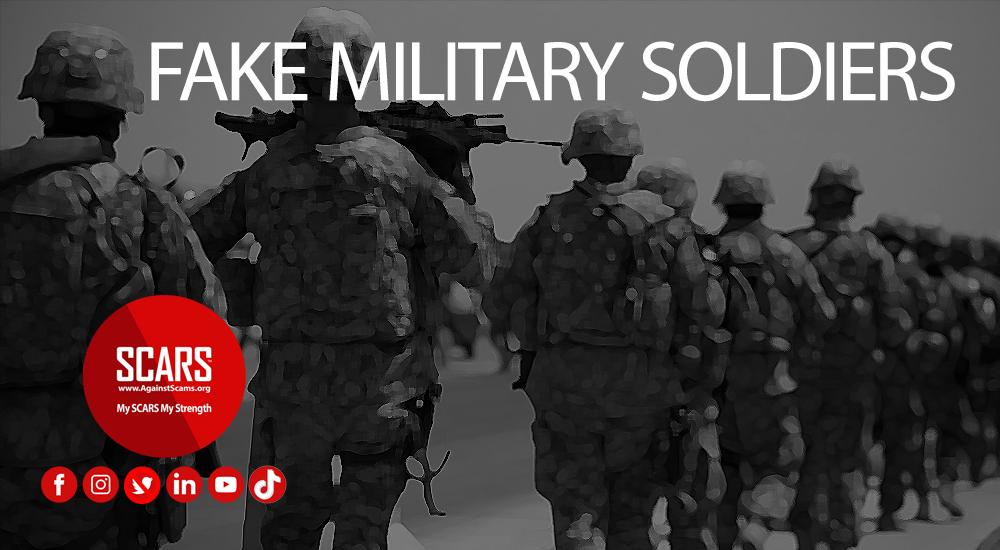
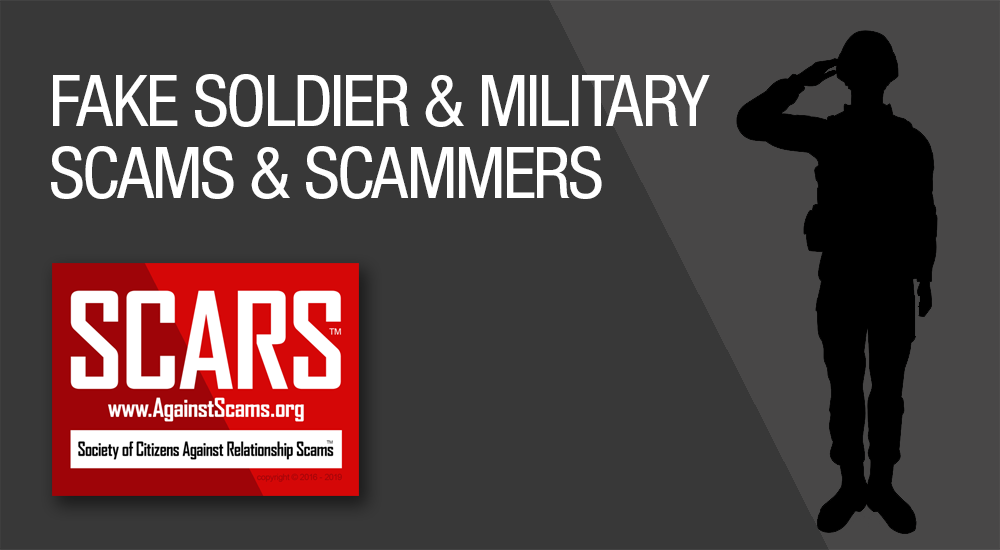

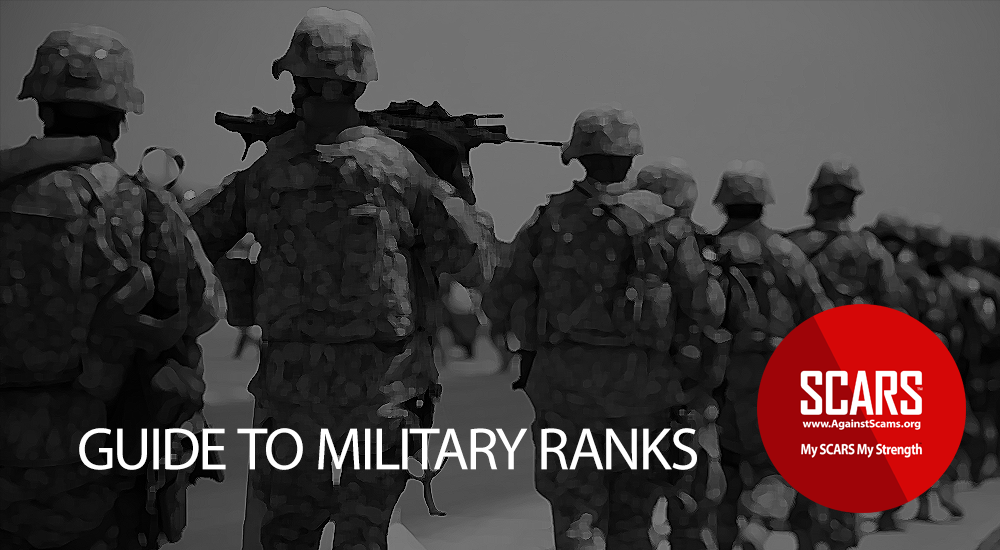
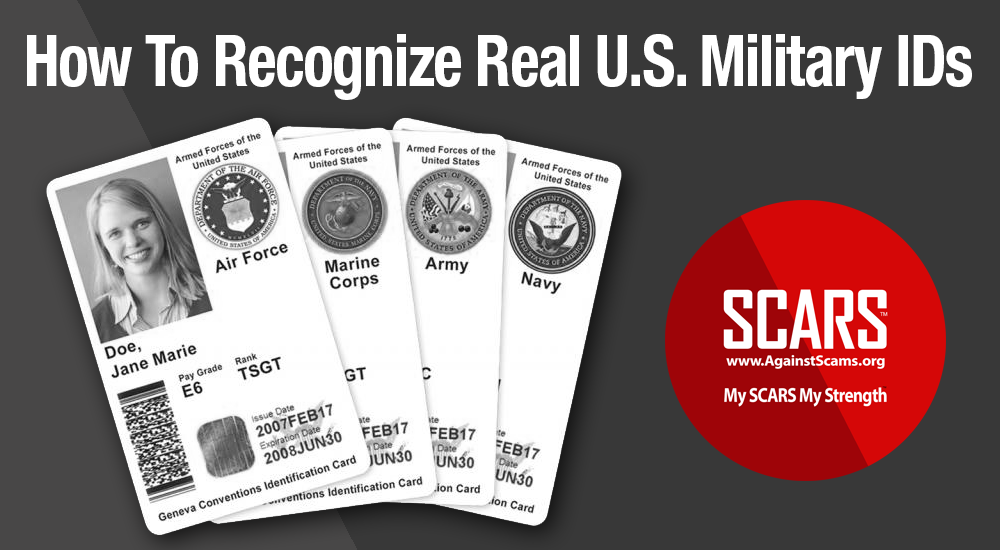





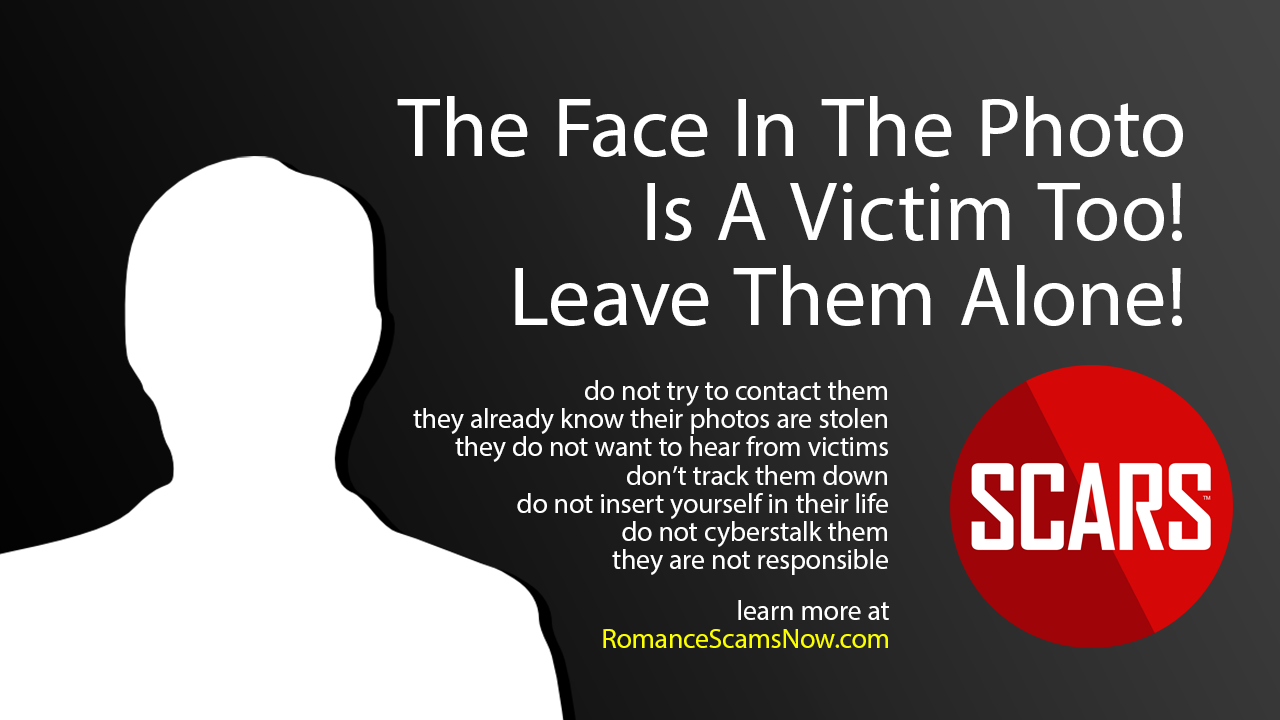















It is unbelievable how we, as victims, see those grammatical mistakes and do not react. We need to see more awareness and education campaigns to help women not to fall for these criminals.
You are blaming yourself for this. You did not see them because your mind was manipulated to not see them.